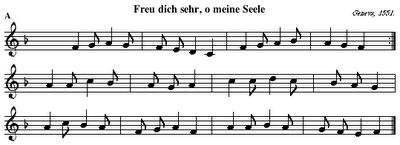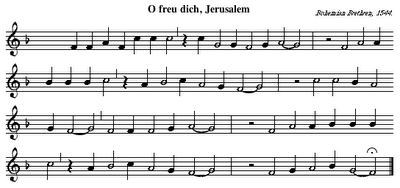Here is my translation of Nicolaus Selnecker’s hymn on the Feast of St. Andrew the Apostle, “Andreä Tag wir haben heut,” written to be sung to the melody, “Kommt her zu mir, spricht Gottes Sohn”
ON ANDREW’S FEAST this day we sing,
To God our thanks and praises bring,
God’s name with gladness blessing
For him who was by John baptized,
His student true, forever Christ
The Son of God confessing.
2. Of Christ’s disciples called the first,
Three more he called from paths dispersed,
Their voice thus multiplying,
Of Jesus Christ to spread the word,
That without guile it might be heard,
The devil’s rage defying.
3. At Pentecost the Holy Ghost
On Andrew fell among the host,
With pow’r to mark his mission;
And so the Spirit, whom before
Unseen within his heart he bore,
Was sensible to vision.
4. To many_a land the truth he brought
The doctrines of th’ Apostles taught,
To German lands and heathen,
Through Moscow’s lands his pathway went,
And through all Scythia also bent
And to the Saxons even.
5. Thus Finnish and Livonian lands
Were taught and baptized by his hands,
And to the Church united,
From Greece to northen climes came he,
And visited the Eastern Sea,
And lands by sin benighted.
6. To Roman soil again he came,
And Patras saw, in pagan shame
And utter darkness lying,
There too he taught, and many turned,
Till he the heathen’s anger earned,
God’s victory supplying.
7. The governor Aegeas urged
Christ’s envoy sorely to be scourged
And suffer crucifixion;
But Andrew’s courage never failed,
Confessing Christ, he thus prevailed,
And bled in faith’s conviction.
8. A wicked spirit then possessed,
The soul within Aegeas’ breast
And hellwards plunged his spirit,
Such is the fate of every foe
Of Christ, who grudge all men to know
His Word, or ever hear it.
9. Lord Jesus, make us also bold,
Thy cross our highest good to hold,
Nor at our own to waver:
Who for Thy sake is crucified
Shall perish not, though he have died:
His name shall flourish ever.
10. E’en as a fire for half an hour
The heavens kindled with its pow’r
And Andrew’s mouth surrounded,
Who then his spirit heav’n-ward sent,
And all the people did repent,
By heaven’s sign astounded:
11. So ever grant, O Christ our Lord,
Thy light upon us to be poured,
Thy Spirit us preserving;
When we from hence in death depart,
Then let it be with all our heart,
And with a faith unswerving.
Translation © Matthew Carver, 2011.
GERMAN
Andreä Tag wir haben heut,
Gott lob und dank, mit Herzenfreud,
sein Nam tapfer und schone.
Von Johann er getaufet war,
des Jünger in der Göttlich Lahr,
erkennt Christ Gottes Sohne.
2. Der erste Jünger Christi war,
dreimal berufen endlich dar,
daß er Apostels Stimme
ließ gehn und Predigt Jesum Christ,
welchs er getan ohn alle List
wider des Teufels Grimmen.
3. Am Pfingsttag er den heilgen Geist
empfing sichtiglich allermeist,
den er zuvor auch halte
innerlich und unsichtbarlich
im Herzen und auch kräftiglich
durch manche Wundertaten.
4. Er hat gelehrt an manchem Ort
wie ein Apostel hie und dort,
auch unser Deutsche Lande,
gen Mitternacht er kommen ist,
Moscken und alls was Scytisch ist,
zun Sachsen er sich fande.
5. In Finnland und Liefland er hat
gelehrt, getauft und früh und spat
die Kirchen wohl bekehret,
aus Griechenland er kam dahin,
aus hoch deutsch Mehr stand stets sein Sinn,
von dann er wiederkehret.
6. Gen Rom kam er und weiter fort,
die Stadt Patras er sahe dort
in Finsternis tief liegen:
Er wand sich hin, lehrt und bekehrt,
darob er ward sehrt verunehrt,
Gott wollt ihn lassen siegen.
7. Der Statthalter, Ägeas gnannt,
ließ geißeln den Christus gesandt
und an das Kreuze hängen.
Andreas war getrost von Mut,
fröhlich, beständig, ließ sein Blut,
Christum er tät bekennen.
8. Ägeas drüber bsessen war
vom bösen Geist, sich selbs fürwahr
gestürtzt herab, tot blieben:
Also geht es den Feinden all,
die Christum und seins Wortes Schall
wollen nur stets betrüben.
9. Herr Jesu, gib uns auch den Mut,
daß wir dein Kreuz fürs höchste Gut
halten und kein Kreuz fliehen:
Wer an das Kreuz gehangen wird
um deinetwilln, der nicht verdirbt,
sein Nam tut ewig blühen.
10. Gleichwie ein Blitz ein halbe Stund
vom Himmel leuchtet und den Mund
Andreä tät umgeben,
welcher darnach sein Geiset aufgab,
und alles Volk entsatzt sich drab,
bekehrt sich auch zum Leben:
11. Also gib uns, Herr Jesu Christ,
deins Lichtes Glanz zu jeder Frist,
dein Geist in uns laß walten.
Wenn wir von hinnen scheiden schier,
laß solchs geschehn mit Herz begier,
den Glauben nicht erkalten.















